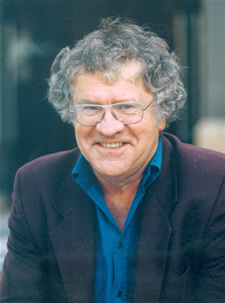Interview with Ian Gibson - Part II - AUTHOR (1939 - Present)
Back to Part I - Forward to Part III
 AC: I have a headline from the Guardian in front of me – and article published in August 2007. It says “Anglo-Irish Academic enjoys surprise hit with novel in Spanish” – this is talking about your first novel “Vientos del Sur”. What kind of response did you expect from this book?
AC: I have a headline from the Guardian in front of me – and article published in August 2007. It says “Anglo-Irish Academic enjoys surprise hit with novel in Spanish” – this is talking about your first novel “Vientos del Sur”. What kind of response did you expect from this book?
IG: (Laughs heartily) That’s a gross exaggeration, actually put out by a friend of mine. I won’t mention any names; a journalist friend of mine in Madrid I think was responsible for that. There was no great hit. It was published in Spanish. The Britts on the Coast aren’t going to read it, are they? And the Spaniards I don’t think are particularly interested in my efforts as a novelist. It hasn’t done badly. It’s really not one of my books that have done best.
AC: You’ve written many scholarly books including the renowned biographies of Lorca and Dali – for example – what has been your favourite project so far? Why?
IG: It all began with Lorca for me. When you’re 18 and you stumble across a poet who speaks to you in a very personal way… I was beginning to learn the language at the time. I was 17 or 18, in a second hand bookshop somewhere in Dublin. I suddenly came across a copy of Lorca’s Gypsy Ballad. I didn’t know the language, but something in those ballads got through to me... Irish literature has never lost its contact with the earth and Lorca is very earthy. His earth was Andalusian, mine was Irish, but the similarity... something enabled me to get into (it). That began and went on and I discovered more about the man, his assassination. And, when I finished, I had to start a doctorate and I decided to embark on a thesis – a doctoral thesis on Lorca and it went on from there.
It’s still with me today. Today I’ve been thinking about Lorca because it’s all inside me and he’s a very, very great poet, one of the greatest European poets, I would say. I’m lucky because I’m the biographer. It all sprang from what you might call a chance encounter with his work, but maybe there was no chance involved. Who knows?
AC: What does a man like Lorca have to offer us today?
IG: Well, you know for a lot of people, he probably doesn’t offer anything. I mean, how many people read poetry? And now that we’re talking about Andalucia, Andalucia is one of the places in Europe that reads least. And it upsets me as a lover of the potential of the Andalucia that might one day flower, come into flowering; people read very little. Who reads poetry here or in Britain or in France? Only a small minority.
IG: Of course, Lorca has the advantage that he’s also a playwright. And I suppose that one of the reasons for his fame is that people have seen the Casa de Bernarda Alba, for example, or Blood Wedding... So he is a very distinguished playwright.
What do people get from him? I get a tremendous excitement and a sort of shudder down the spine when I read him, feelings of depth and mystery in his work. I suppose I’m a romantic... I think it was Keats who said, you’re reading a poem, when you’re reading a genuine, authentic poem, you can feel the hair rising on your wrists. It’s that kind of electric charge that I get from Lorca. Not just from Lorca, of course... I’ve also written about Antonio Machado, another great Spanish poet. I mean, I get this from – it could be a French poet or British. I get this reaction of the hair rising on the wrist. If I don’t get that, then I’m not particularly turned on.